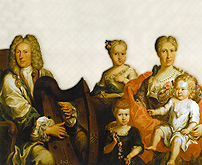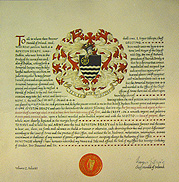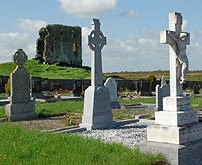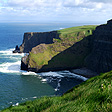FINDING MY IRISH ANCESTORS
Following The Family Tree to Ireland
 So,
your name has an O’ or a Mc or Mac in front of it and your da’ always
said your great-great-great someone – was a Celtic Prince at the
right hand of St Patrick, or a poor lad who left with the “potato famine” and
you’ve
decided to venture to the land of leprechauns (not as many around as you
might think)
and follow the family roots. There have been several waves of migration from
Ireland to the west and where your family is from may depend a great deal
on when they left the green and gorse homeland. In the 7th Century Irish
Monks ventured to the continent to Christianize Europe, establishing monasteries
(see St
Gallen Library). A thousand years later the nobility of the 17th
Century defeated by the invasions
of Cromwell left to win glory in the armies of Austria, France and Spain.
In the 1700s before the revolution Presbyterians and “Scotch-Irish” ventured
across the Atlantic for the relative freedom on the British colonies of America,
spreading in the hills of the mid-Atlantic and south. The famine of the 1840s
brought a mass exodus of Irish immigrants to New England, New York and Canada.
Before booking a flight to the storied land of your ancestors, take a study
of the history of your family. Relatives may have stories of the past handed
down. Some may be accurate, some, well maybe not. A number of internet sites
can help trace your family from the comfort of your living room.
So,
your name has an O’ or a Mc or Mac in front of it and your da’ always
said your great-great-great someone – was a Celtic Prince at the
right hand of St Patrick, or a poor lad who left with the “potato famine” and
you’ve
decided to venture to the land of leprechauns (not as many around as you
might think)
and follow the family roots. There have been several waves of migration from
Ireland to the west and where your family is from may depend a great deal
on when they left the green and gorse homeland. In the 7th Century Irish
Monks ventured to the continent to Christianize Europe, establishing monasteries
(see St
Gallen Library). A thousand years later the nobility of the 17th
Century defeated by the invasions
of Cromwell left to win glory in the armies of Austria, France and Spain.
In the 1700s before the revolution Presbyterians and “Scotch-Irish” ventured
across the Atlantic for the relative freedom on the British colonies of America,
spreading in the hills of the mid-Atlantic and south. The famine of the 1840s
brought a mass exodus of Irish immigrants to New England, New York and Canada.
Before booking a flight to the storied land of your ancestors, take a study
of the history of your family. Relatives may have stories of the past handed
down. Some may be accurate, some, well maybe not. A number of internet sites
can help trace your family from the comfort of your living room.
Online Ancestry Research
 Ancestry.com charges
for a membership but can provide a number of original documents. Ancestry
has just added some new documents to their Ireland data base, the Ordinance
Survey Maps covering 1824 to 1846 and improved their Griffiths Evaluation
and Tithe records. This can give you some serious information to drill
down the details. Rootsweb is
owned by Ancestry but allows for free family tree tracing without the records. Family
Search of the Church of Later Day Saints can provide
extensive tree searching. Depending on how far back your roots go before
the era of emigration, the records from Ireland may be sketchy, stopping
with the first immigrant. Irish online sources can be consulted. Irish
Genealogy is an Irish government site established for genealogical
sources relating to Ireland. The complete 1901
census at
the National
Archives has now been put online for free access. The Irish
Family History Foundation,
is a fee membership site linking many local county-based genealogical research
centers with a database of records.
Ancestry.com charges
for a membership but can provide a number of original documents. Ancestry
has just added some new documents to their Ireland data base, the Ordinance
Survey Maps covering 1824 to 1846 and improved their Griffiths Evaluation
and Tithe records. This can give you some serious information to drill
down the details. Rootsweb is
owned by Ancestry but allows for free family tree tracing without the records. Family
Search of the Church of Later Day Saints can provide
extensive tree searching. Depending on how far back your roots go before
the era of emigration, the records from Ireland may be sketchy, stopping
with the first immigrant. Irish online sources can be consulted. Irish
Genealogy is an Irish government site established for genealogical
sources relating to Ireland. The complete 1901
census at
the National
Archives has now been put online for free access. The Irish
Family History Foundation,
is a fee membership site linking many local county-based genealogical research
centers with a database of records.
Researching Ancestry in Ireland
After arriving in Ireland, if you don’t have your ancestral path laid out, your first stop would be the National Archives, located in Dublin’s Bishop Street. The Genealogy Service provides free advice on how to conduct family history research in any of the record repositories in Ireland. The National Library in Kildare Street has a room dedicated to genealogy where on-line databases are available and library staff can offer assistance. The entry foyer to the National Library has an exhibit on the 17th Century “Flight of the Lords” called Strangers to Citizens on the Irish Nobility in Europe. You might even qualify for a Heraldic Coat of Arms for which you can apply at the Office of the Chief Herald. This takes some time and some proof. If you want a quick unofficial souvenir coat of arms to take home, you can get one at the shop on Dame Street across from the City Hall.
 If
your ancestors came before the famine of the 1800s the search for a past
may be more complex
as record keeping was scarcer. If your family is protestant
Irish or Scots-Irish from the 1700s, most of Ulster Presbyterians who went
to the American colonies sailed to port like Philadelphia and then
dispersed throughout the frontier southern states. A number of U.S Presidents
had Scots-Irish ancestry. If this is you, you’ll want to head to Northern
Ireland. The Ulster-American Folk Park in County – near Derry traces
this history experience (see Ulster
American Emigration Park) and not far
away is the homestead of the families of Ulysses S. Grant (see Grant
Homestead)
or Woodrow Wilson.
If
your ancestors came before the famine of the 1800s the search for a past
may be more complex
as record keeping was scarcer. If your family is protestant
Irish or Scots-Irish from the 1700s, most of Ulster Presbyterians who went
to the American colonies sailed to port like Philadelphia and then
dispersed throughout the frontier southern states. A number of U.S Presidents
had Scots-Irish ancestry. If this is you, you’ll want to head to Northern
Ireland. The Ulster-American Folk Park in County – near Derry traces
this history experience (see Ulster
American Emigration Park) and not far
away is the homestead of the families of Ulysses S. Grant (see Grant
Homestead)
or Woodrow Wilson.
If your family came across after 1800, you may have a more complete record to follow. Before the 1840’s you’ll have to locate local parish records. For later immigrants the General Register Office Research Room in Dublin holds civil records of marriage, birth and death from 1845 for Protestants, and from 1864 for Catholics. Civil records for Northern Ireland after 1922 are found at the Register Office in Belfast.
For more detailed searching of records in Ireland - the Valuation Office is located in the Irish Life Center in Lower Abbey Street, Dublin, holding manuscript revisions of Griffith’s Valuation, documenting changes of land occupancy with corresponding maps. The Registry of Deeds in Henrietta Street was established in 1708 to regulate property transactions. If your family owned land, whether aristocracy or of the professional class, you might find a deed. If your family were tenant farmers this is less likely. The Representative Church Body Library is the principal archives repository of the Church of Ireland (the Anglican Church) with registers of over 600 parishes from counties now in the Republic of Ireland. The Society of Friends (Quakers) have been keeping records since the 17th century with registers of birth, marriage and death held at the Dublin Friends Historical Library (also on microfilm in the National Library). Local counties may also have libraries, history centers, genealogical societies or parish churches which may have records not in the national data bases or repositories.
Once you have some firm research in hand, you can set out across Ireland to the county or parish where your family lived, or perhaps even find the very house where an ancestor was born, visit the church where they prayed, take a tracing of the family graves at the local cemetery, or walk the city street or village square that was at the heart of their Irish life. © Bargain Travel Europe
Find best hotel and travel deals in Ireland on TripAdvisor
Other
Web Resources
Professional Genealogists
in Ireland
Irish Origins
These articles are copyrighted and the sole property of Bargain Travel Europe and WLPV, LLC. and may not be copied or reprinted without permission.
SEE ALSO:
DRIVING
IRELAND'S SCENIC COUNTRYSIDE
25 FREE THINGS TO DO IN IRELAND
DUNBRODY
FAMINE EMIGRATION SHIP
US PRESIDENTS IRISH HERITAGE TRAIL

